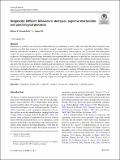Reciprocity : different behavioural strategies, cognitive mechanisms and psychological processes
Abstract
Reciprocity is probably one of the most debated theories in evolutionary research. After more than 40 years of research, some scientists conclude that reciprocity is an almost uniquely human trait mainly because it is cognitively demanding. Others, however, conclude that reciprocity is wide-spread and of great importance to many species. Yet, it is unclear how these species reciprocate, given its apparent cognitive complexity. Therefore, our aim was to unravel the psychological pro-cesses underlying reciprocity. By bringing together findings from studies investigating different aspects of reciprocity, we show that reciprocity is a rich concept with different behavioural strate-gies and cognitive mechanisms that require very different psychological processes. We reviewed evidence from three textbook examples, i.e. the Norway rat, common vampire bat and brown capuchin monkey and show that the species use different strategies and mechanisms to recipro-cate. We continue by examining the psychological processes of reciprocity. We show that the cog-nitive load varies between different forms of reciprocity. Several factors can lower the memory demands of reciprocity such as distinctiveness of encounters, memory of details and network size. Furthermore, there are different information operation systems in place, which also vary in their cognitive load due to assessing the number of encounters and the quality and quantity of help. We conclude that many species possess the psychological processes to show some form of reciprocity. Hence, reciprocity might be a widespread phenomenon that varies in terms of strategies and mechanisms.
Citation
Schweinfurth , M K & Call , J 2019 , ' Reciprocity : different behavioural strategies, cognitive mechanisms and psychological processes ' , Learning and Behavior , vol. 47 , pp. 284–301 . https://doi.org/10.3758/s13420-019-00394-5
Publication
Learning and Behavior
Status
Peer reviewed
ISSN
1543-4494Type
Journal item
Description
The Swiss National Science Foundation provided funding to MKS (grant number P2BEP3 175269). The European Research Council provided funding to JC (Synergy grant 609819 SOMICS).Collections
Items in the St Andrews Research Repository are protected by copyright, with all rights reserved, unless otherwise indicated.

